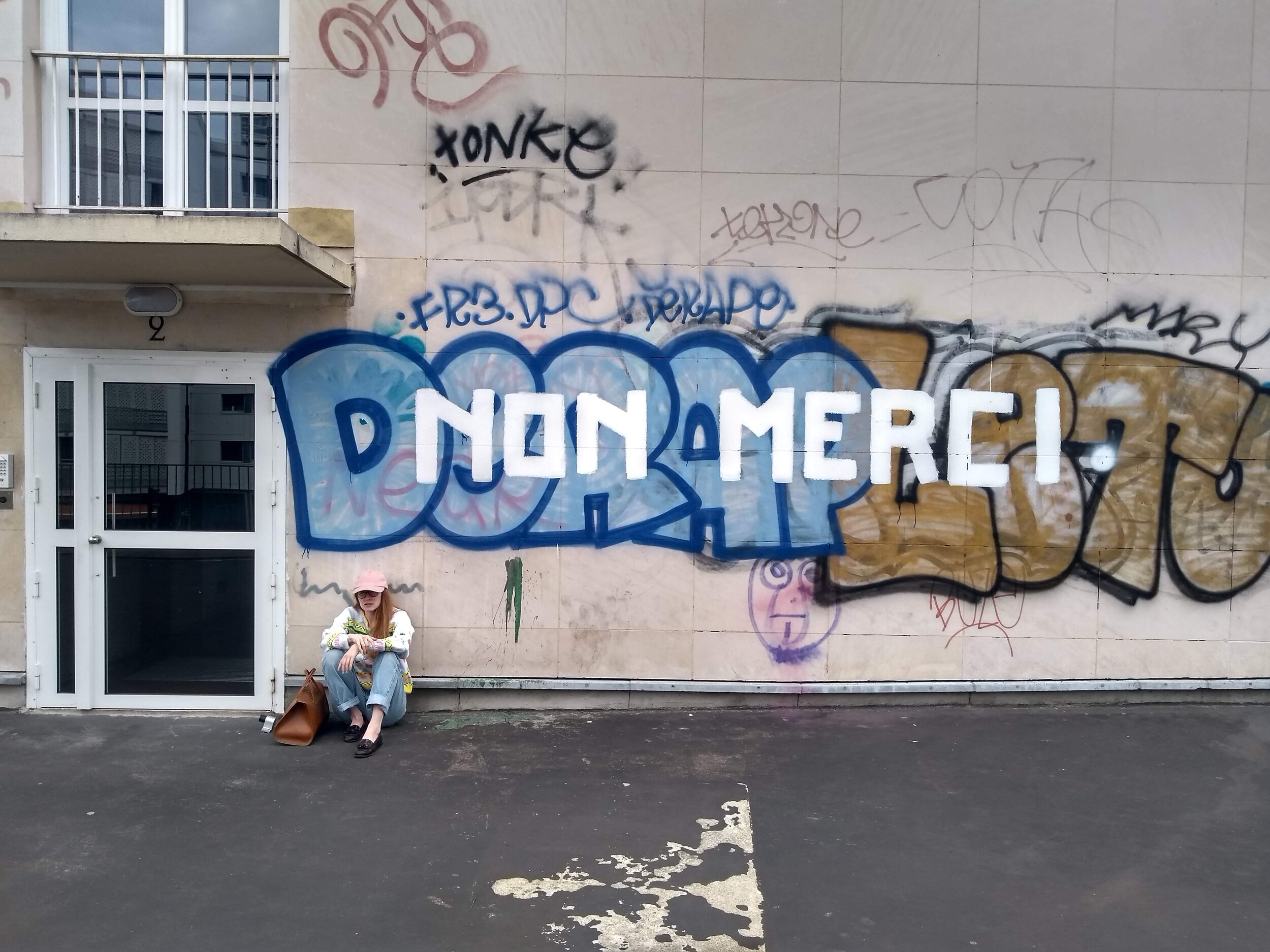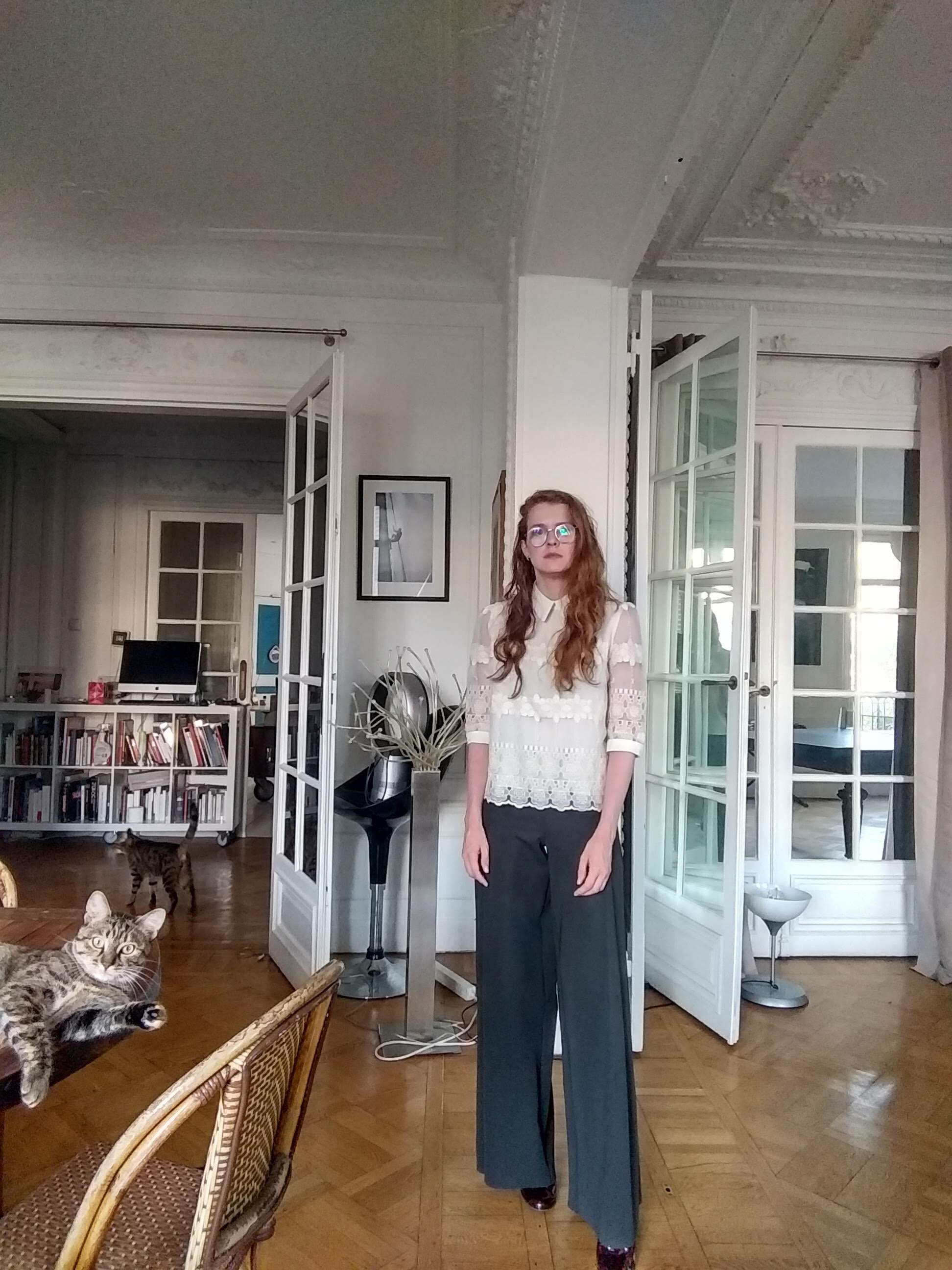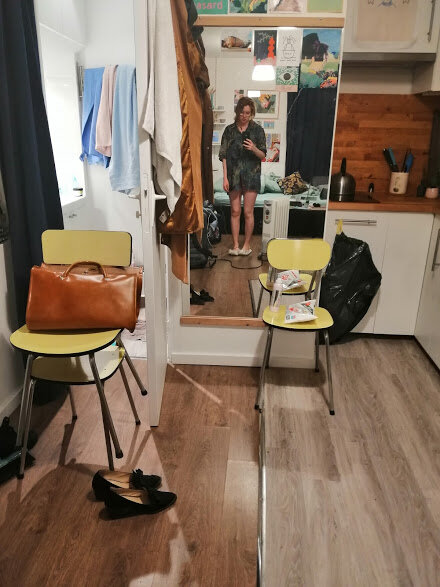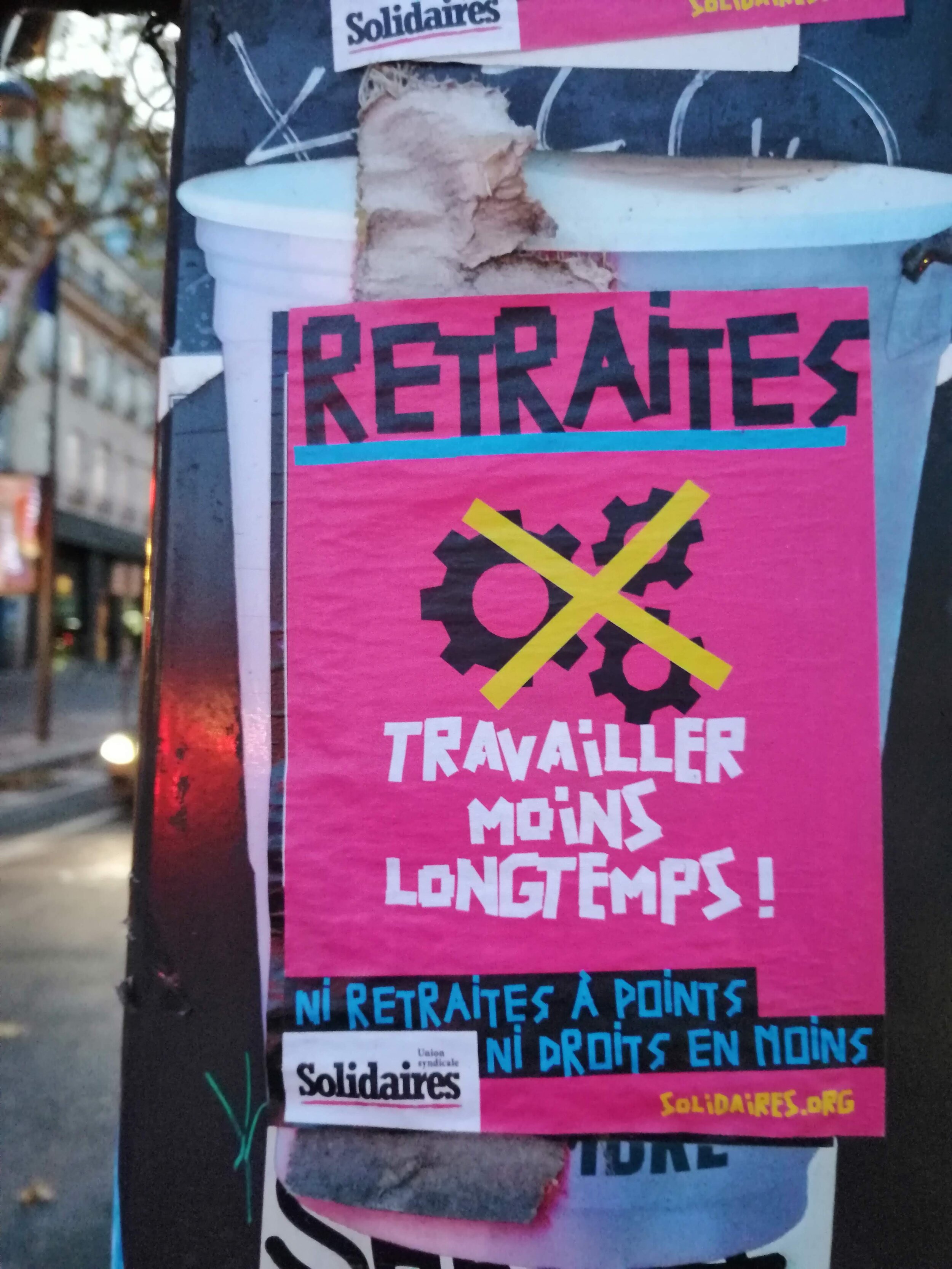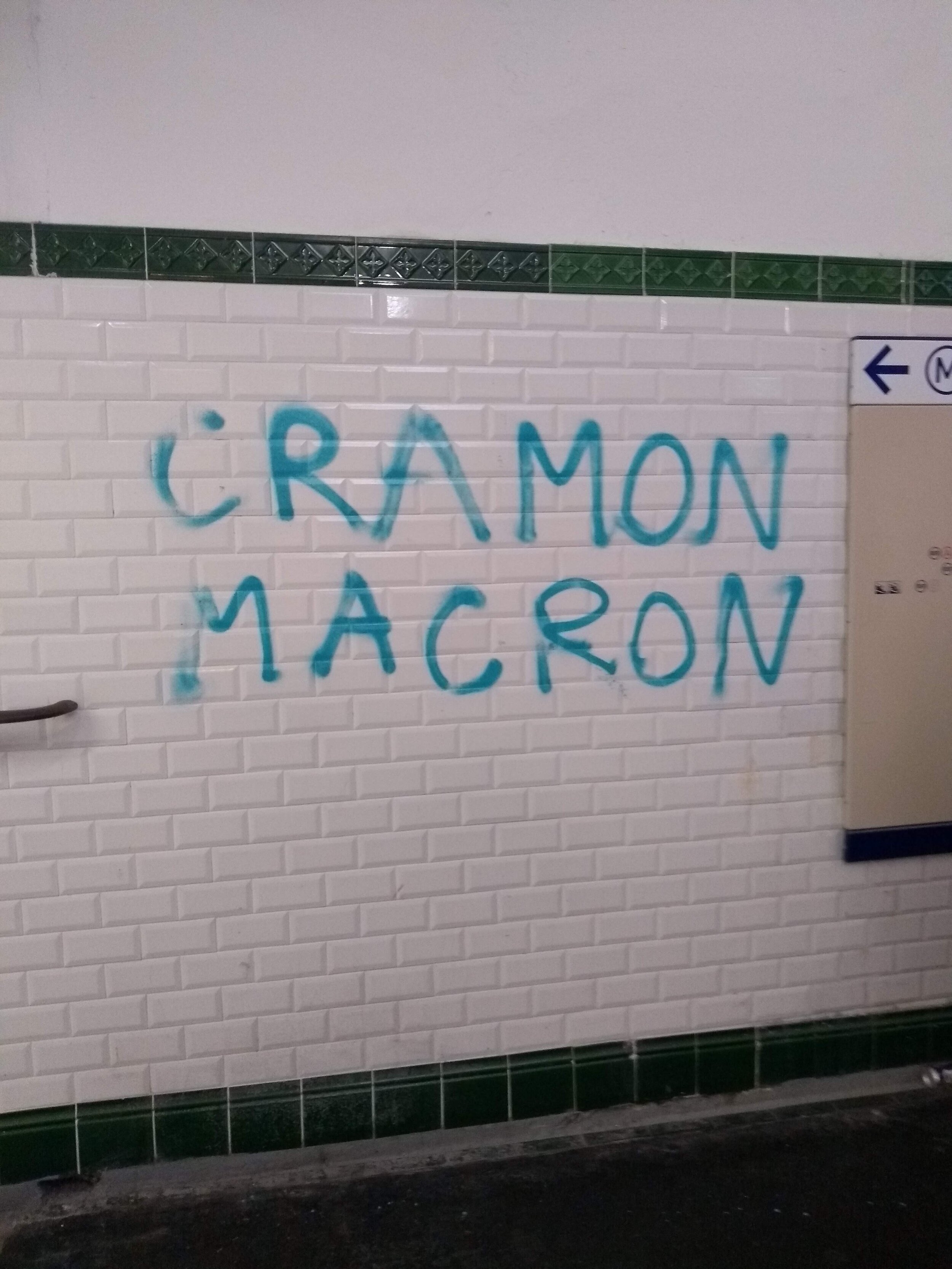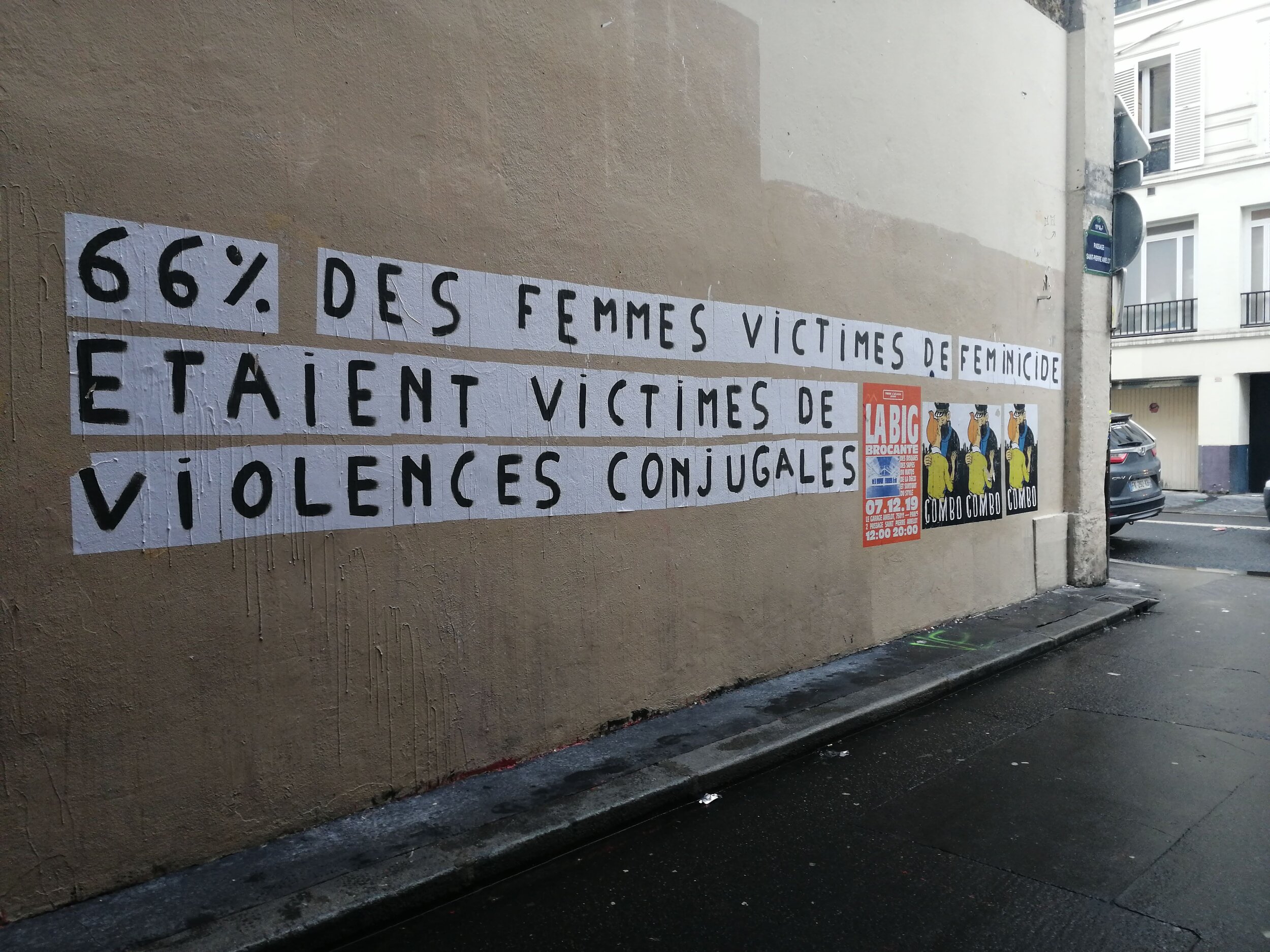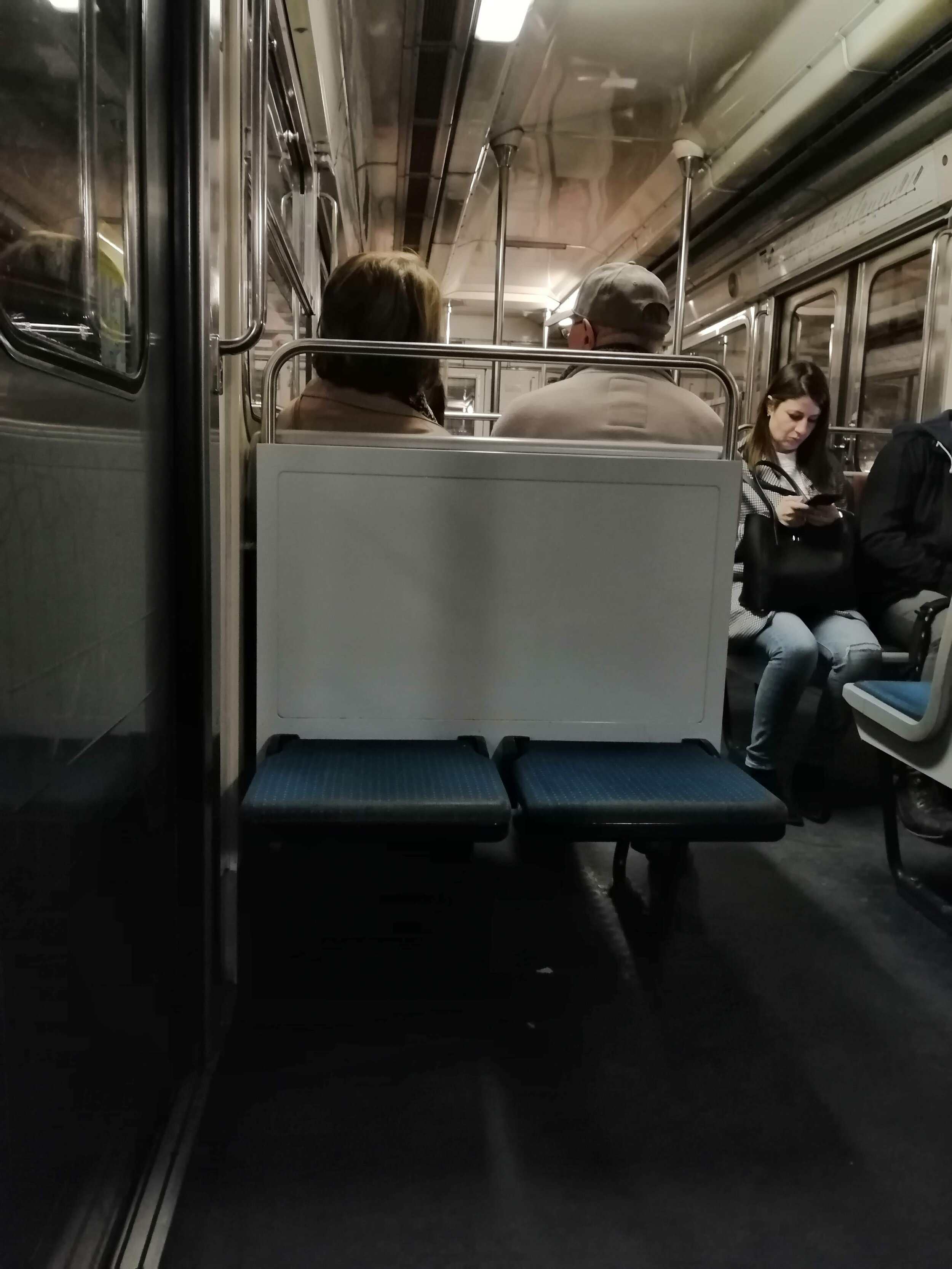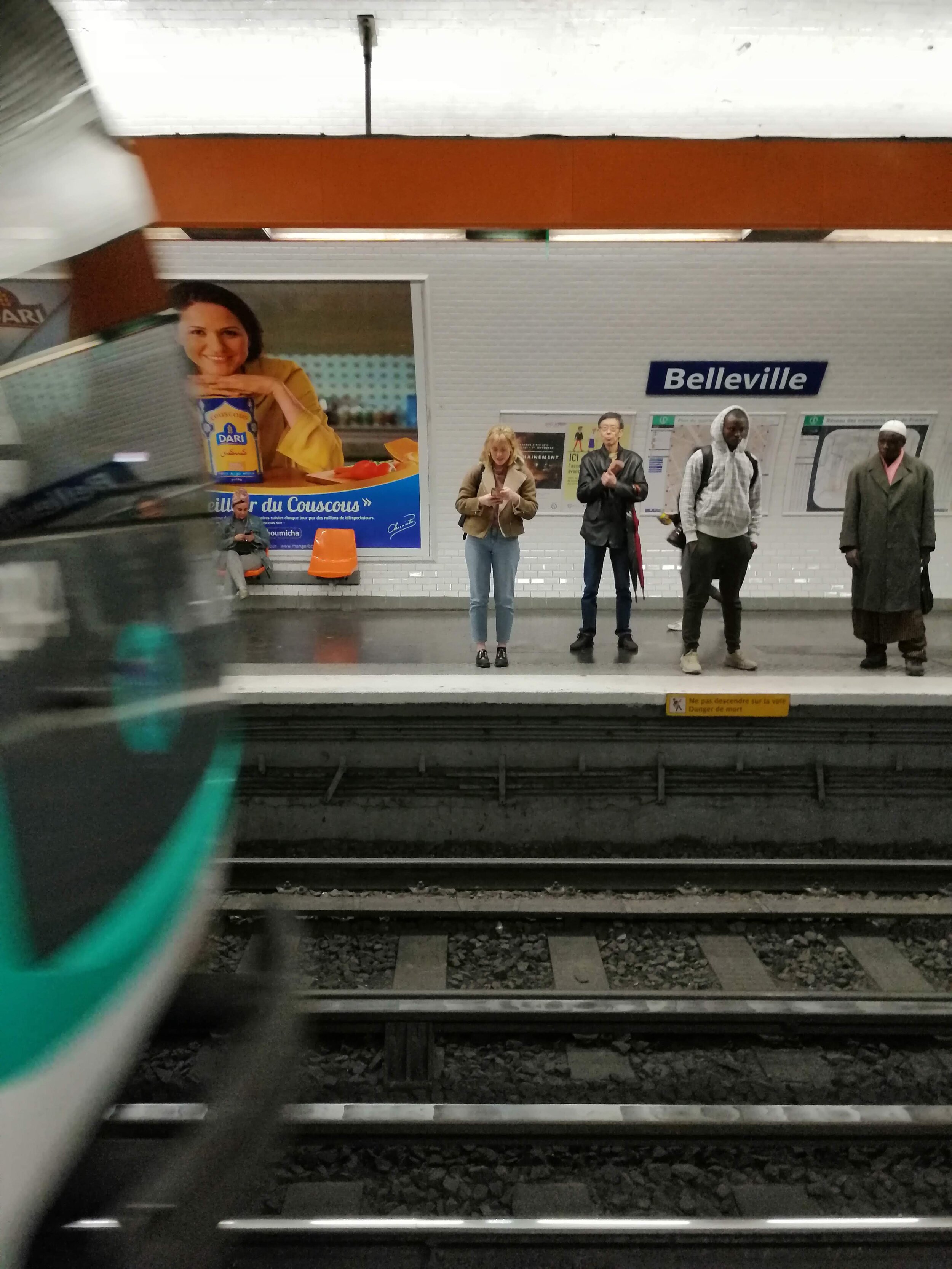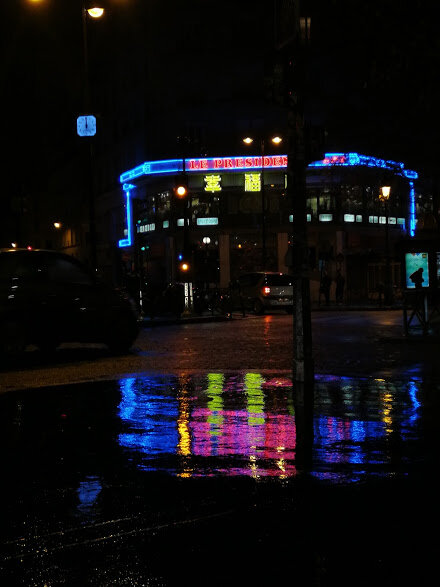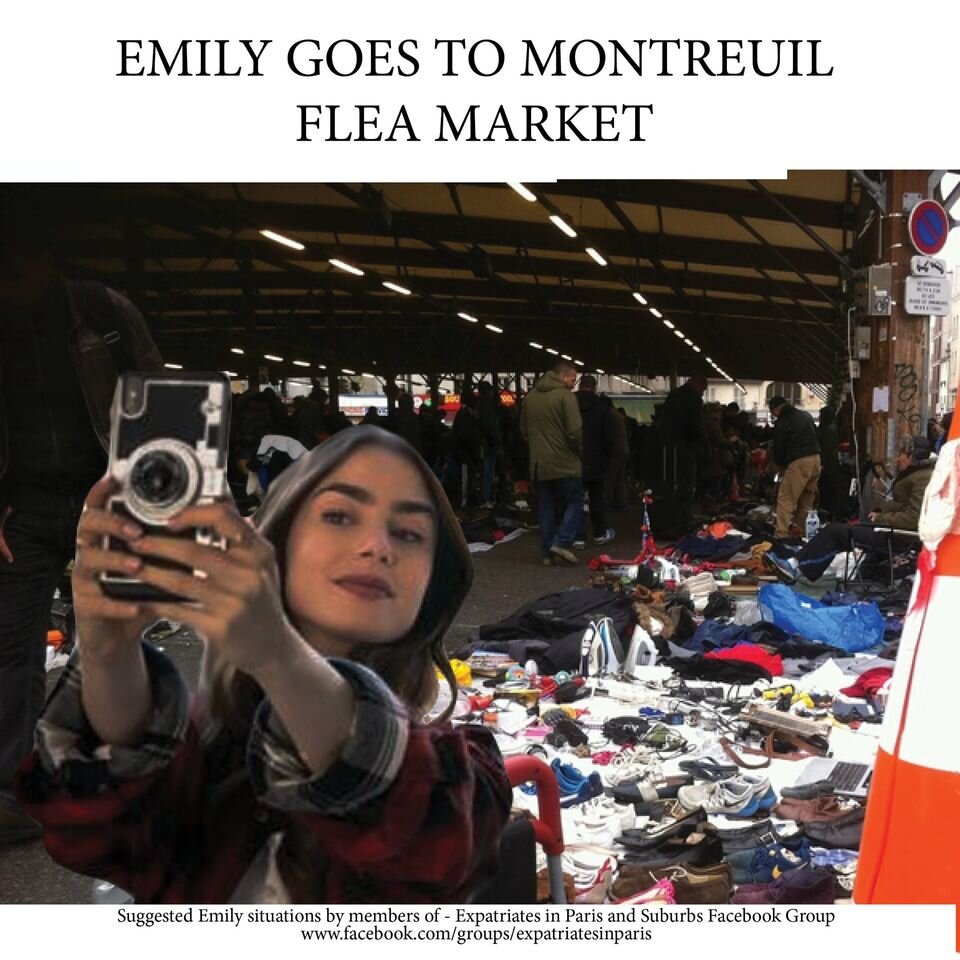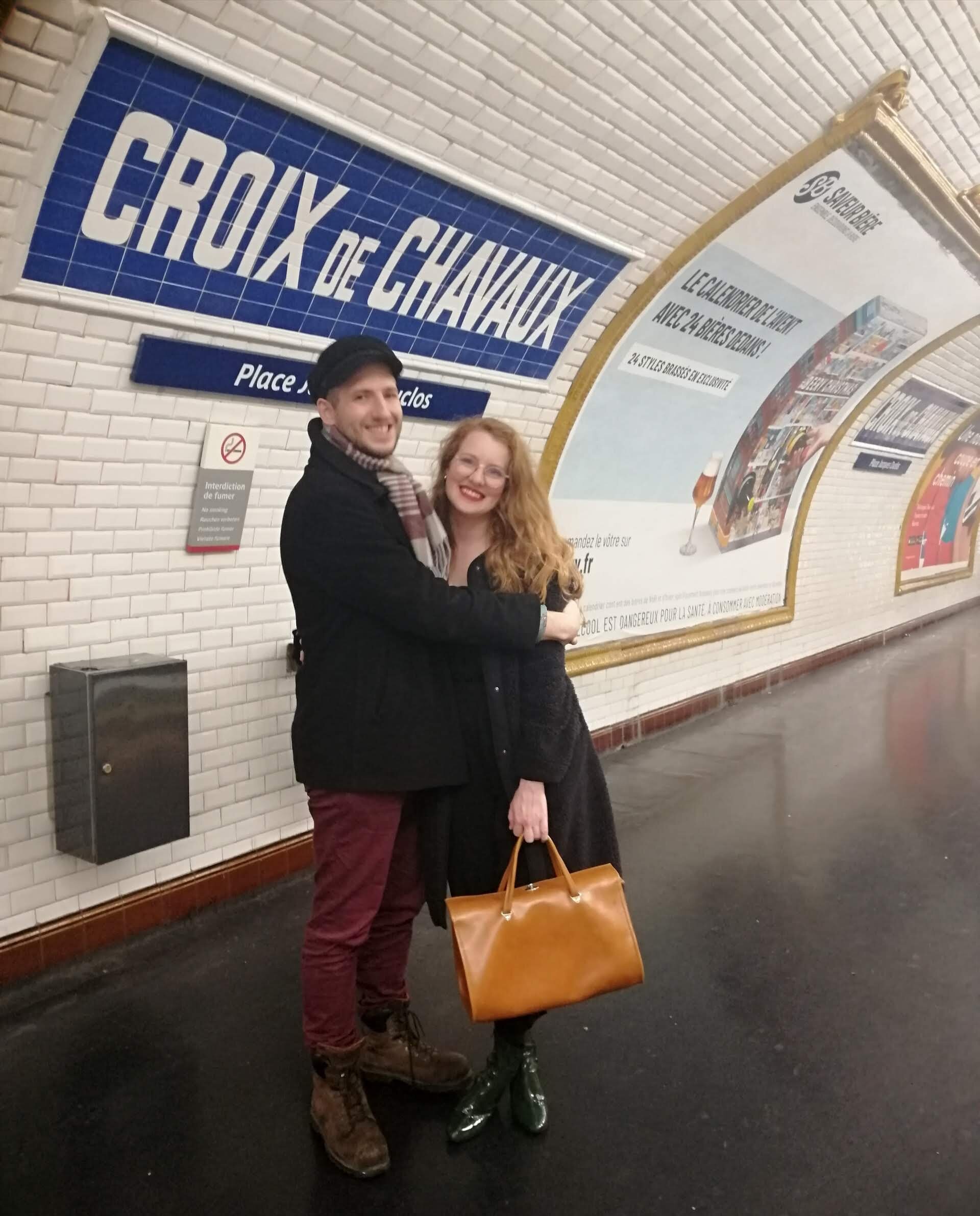Non merci à Emily in Paris
All photographs my own.
Above: On se balade un peu :)
Below: Me in the Marais vs. me in my studio of 20 mètres carrés à Montreuil.
Fall 2019, Paris. My travailleur temporaire visa was on the brink of expiration. After three years of being in the country, I knew I was sending myself back to Canada[1] when I did not renew my teaching contract. Unable to find a job that would renew my visa in a legal fashion, I remained open to fun opportunities in my daily life, however ridiculous. I found myself perusing Figurants.com and, on a whim, applied to be an extra for a couple of Netflix series. However, I did not attend either tournage when a friend invited me to Zurich.
Fast forward a year. Emily in Paris aired on Netflix this month. Although the premise of the show did sound like it would be filled with egregious stereotypes, who doesn’t like being behind the scenes? I was intrigued to see the fruits of the labour I could have witnessed in real life. Malheureusement, Emily in Paris is set up in such a formulaic way that it was difficult for me to enjoy and not scorn… yet I couldn’t stop watching. Many people seem to feel this way.[2] So why are we watching it? To feel schadenfreude? Not exactly… Everything works out in Emily’s favour, and many of her mishaps are inconsequential. To make fun of Americans? Well, perhaps… But Americans have far greater problems than not knowing what the rez-de-chaussée is.
I suppose I watched the show simply because it is set in Paris. Some people check their ex’s Instagram account, I like to torture myself by remaining up to date on everything that goes in France. This show was filmed in recent times before the pandemic, which piqued my interest, along with the memes.
When I moved to Metz and then Paris, I could list my acquaintances on less than one hand, so it would be remiss of me not to acknowledge that anglophones can gravitate to each other if they don’t make a concerted effort to connect with French people. I met my first friend in the Paris region (an Australian) at a work orientation in Cergy since neither of us wanted to sit with the Americans (who formed the majority of the participants and asked many redundant questions). However, I am also très proche to a New Yorker[3] who spent six years in France, so I will not be entertaining comments from people who say that #NotAllAmericans are like Emily in Paris. Je sais. This piece is solely intended to outline what made me cringe as someone who originally occupied the city as an outsider, much like the title character.[4] Some readers may remind me that “Paris is an idea” and the show is fiction, so there’s no need to critique it.[5] What did I expect from Darren Star? I don’t know, I never watched Sex in the City either.
Nothing is guaranteed at the prefecture.
Note that I will refrain from addressing the geographical discrepancies,[6] the fact that Emily never takes the métro, or the dubious quality of her social media content (in most of the angular selfies, we can barely ascertain that Emily is in Paris.[7] Without further ado, here are my remarks on Emily in Paris and its glorification of American exceptionalism as it promotes a capitalist vision of Paris that even the bourgeois find inaccurate.[8]
Emily’s demeanour purportedly represents a typical Midwestern girl, but we know her lifestyle in Paris would never be accessible to one. In real life, Emily would be an unpaid stagiaire or make under 1000 euros a month despite her master’s degree(s).[9] Maybe she would receive a carnet of tickets restaurant, and 50% of the price of her pass Navigo would be reimbursed so she could take the metro to work. However, her American employer is somehow able to send her to a boutique marketing agency in Paris. There’s approximately four other employees, but the office is not even in a coworking space. Instead of making Emily loiter outside Savoir in the first arrondissement, an episode should have been filmed about her mandatory visit to the prefecture; better yet, la visite medicale. Perhaps Emily could wait two hours there to get a chest x-ray from a strange man. I remember feeling so shocked when I was instructed to take off my bra for my first chest x-ray. Glad I didn’t have tuberculosis!
Au sujet de la nudité, unlike France in real life, this show does not feature much. I wonder if the producers were trying to portray Emily as “prim and proper” to French audiences (thus underlining the stereotype that Americans are more “prudish”)? Emily does not even take off her bra to chat with Doug… an egregious character. When Doug brandishes his passport on the video chat (before he breaks up with Emily and remains in Chicago), he reminds us not to take our passports for granted. Approximately half of Americans do not have passports and have not necessarily have travelled outside their state or country.[10] However, that doesn’t mean they shouldn’t be able to access more authentic content. In fact, it’s all the more reason to make diverse television. Ashley Ray, who tweeted that Emily in Paris motivated her to finish her pilot, said it better than I could (on Substack):
“As far as I can tell, white women on TV need to get it together. Mostly, because I’m worried about what it means for the future of diverse TV for the rest of us. If the industry uses white women as a measure for what diversity is and they think people want walking Trapper Keepers like those depicted in Emily in Paris or Love Life, what shows will they want to see from writers of color? Will they force us to adapt to this bland norm if this bland norm is what’s selling? If the progress brought on by Enlightened or Girls ends with I May Destroy You and Insecure, will networks go back to only wanting black stories if they follow certain patterns of respectability or please the white male gaze like Emily in Paris?
As someone who wants to write a future of weirdo, queer black TV characters who sweat, show their pubes and definitely have nipple rings, it’s a trend that worries me. And as someone who wants to see trans, queer, nipple ring-loving white people on TV, this worries me. So, I need white women to be interesting again. Because the industry remains dedicated to using the success or failure of white shows to make their programming choices. And no one wants a “black version” of Emily in Paris five years from now called Laquisha in London or some shit.”
I too am tired of these fake stories. Even if you jazz up her outfits and give her multiple (lacklustre) love interests, Emily is simply not a character we’d want to see on screen. We’re just subjected to her. We don’t need another movie about a white American girl getting what she wants. Why not just watch French productions, you ask?[11] Well, to the best of my knowledge, a contemporary television series about moving to France that is not satirical is not available on a major platform. This show is admittedly accessible to anglos (and ratings will benefit from the fact that people of all nationalities can ridicule it). With that said, I think everyone deserves better content.
Karlie Kloss at Pont Alexandre III
It’s not uncommon to spot models on this bridge.
Emily inserts herself in every work situation possible. She is excruciatingly earnest and thinks that she has to “help” everyone, especially if there is a conflict of interest. She does not respect Sylvie’s boundaries (and the most annoying part is that you can tell the writers wanted you to feel like Emily is “winning over” Sylvie). It’s Sylvie and the clients who have to change because Emily has brought them her wonderful ideas. It’s Sylvie who will realize that Emily is right. The only time Emily made a remotely useful comment was when she suggested that an ad (being filmed on Pont Alexandre III, no less) was sexist. That was a valid critique even if it didn’t land with Antoine. The whole show reinforces this nauseating idea of Franco-American collaboration, but in a very one-sided manner. From smarmily telling her colleagues that they need her for her American perspective to ostentatiously waving the American flag on her boat ride, Emily never relents. She does not take time to truly listen to the French people.
A typical lycée.
I’m not innocent. As a white woman from North America, I inserted myself in an environment that was not my own to teach English to French students, particularly those in the Parisian banlieue. I have since learned why this is problematic even if many of them were interested in English and “North American culture.” I did this to finance my lifestyle in France. My colleagues said the students were “lucky to have me” and wanted me to give them an American perspective (no matter how many times I reminded them I was from Canada). As an introvert who has struggled with mental illness, it became difficult for me to put on a performance every day. [12] Even if I didn’t take it personally, I was often ignored (as evidenced by a belated chorus of Elle a dit quoi?) I had to pretend I didn’t know much French, so that my students would more readily speak English. My ability to earn money was contingent on my ability to be the cheery foreigner (a hype girl for the English language, if you will) and discuss elements of my former life that didn’t necessarily interest me that much. The teens appreciated the fact that I sounded “like an American.” I did try to show them some real videos of North American high schools, and I revealed the truth about Thanksgiving, but they generally reacted better to the news that I hailed from the same province as Shawn Mendes.[13]
Of course, I must acknowledge that people of colour face actual microaggressions, outright discrimination, and racism (and are asked where they are “really from” all the time in Paris). I was only occasionally dismissed by the French because I was not American or not French… My heritage/identity did not pose a huge problem to them. I jumped through the institutional hoops with little difficulties because of my race and education, although Sylvie’s comments on smiling were reminiscent of one colleague’s remark to me que je souriais trop.
Overcoming challenges in another country is difficult until that sweet moment of invigoration hits… Yet nothing about this show made me feel more alive (it was just douloureux) because I couldn’t really get behind the idea that anything Emily was experiencing was a problem. When her boxes arrive, Gabriel instantly carries them up the stairs. The dog shit is strategically placed by the bistro. I could not even be contented by the scenery because it did not depict where I used to spend time, however grimy. Even when Emily witnesses a man pee, it’s on the banks of the Seine (and she has a fellow American on the phone). Where’s the Marx Dormoy metro? Where’s the graffiti that says Cramon[s] Macron? Or the collages about femicide?
The show is not fun because it doesn’t give us anything new. It’s a capitalist narrative that focuses on how Emily wholeheartedly embraces every cause to which she is assigned in addition to performing other unsolicited tasks. The perfect worker. Showing up early, bringing gifts to her boss. At the influencer launch, she immediately begins filming herself to catch the attention of the head of Durée. Even if her work is portrayed as glamorous, we don’t see her in too many situations that aren’t intended to advance her career. No man writes Emily that he is “fatigué de cette putain de vie,”[14] so he can’t see her again. Au contraire, everyone just keeps running into Emily! She can’t accept being fired because, jokes about the bureaucracy aside, she would have little else to do with her free time. What would she do? Flâner? Emily likes precision and is mainly inconvenienced by other white people ignoring her “expertise.” She’s not rearranging her RER trajet to work because of a mouvement social or a la grève. Mindy always shows up exactly when she needs her ego stroked (particularly in relation to the men). A lunch invitation from Camille represents one of the more dramatic moments on this show… Rather than happily accepting, Emily wonders, Will she be outed for kissing Gabriel? Yet every time the protagonist gets away with something, it doesn’t feel fun or triumphant. It’s just pathetic.
In terms of cringe, American Friends of the Louvre took the cake. Why meet locals or work on your French when you could go to Ralph’s to discuss a fundraising opportunity? We’re not sure what they are fundraising for precisely, but it’s a great example of yet another exclusive American organization posturing as benevolent. Take the American Library in Paris, for example. It costs ten euros to access for one day and a student membership is one hundred euros a year. Not very accessible, but it creates what they call “a haven to work, read, and relax.”[15] I’m sure they have a way to justify these fees. I’d personally rather support the Paris libraries (where French people do have free access to English materials) rather than an American institution. Why does there have to be an American version of everything? I’m so sick of it.[16]
A staircase at a lycée in Metz, France.
Emily wears Chanel[17] and dines consistently at Palais Royale but cannot afford to pay her French instructor fifty euros. One of my favourite parts of the show was when Emily tried to acquire further information from her instructor outside of class and was informed of the hourly rate. For someone who constantly pitches “being part of the conversation” to her colleagues, she is not interested in learning how to have a true dialogue. She only exists as a prop to offer the American perspective to the point where she is mentioning her time at an outlet mall near Winnetka at Palais Garnier.[18] Perhaps we are supposed to think, “Wow, look how far she’s come.” Beyond the literal geographical distance between Chicago and Paris, I’d say her character has not traversed much. She exists to ensure that the rich may manifest their purchasing power... but in an American way!
The person who expresses the most dissent, Thomas, is a caricature of a snob because the French people aren’t allowed to critique anything too hard (this is an American show, after all). We’re not supposed to like Thomas because he isn’t enabling anyone’s desires least of all an American’s (he’s even physically in Emily’s way at the opera). Camille, par contre, is a sweet French girl who befriends Emily (and gives her professional opportunities), but Emily is tout prête to help Gabriel cheat on her. I won’t moralize about that, but I will say that it is particularly awkward when Gabriel is about to leave for Normandy and Emily calls him the first friend she made in Paris??? All she did was use him for his shower and cooking skills! (Some may argue that she helped him by bringing people to his restaurant, but that gesture was only out of desperation when she couldn’t get into Le Grand Véfour.) Even if the show’s writers wanted to play up the stereotype that French men are ready to cheat at every turn, Emily has no chemistry with Gabriel. This is not an exploration of ethical non-monogamy, which does exist. I can confirm that I was once asked out by Place des Vosges while walking down boulevard Beaumarchais… but when I texted the guy next day to ask if he wanted to come to Parc de la Villette, he told me he had a girlfriend. It is true that the French have an interesting approach to manners of fidelity. I even met a young married man whose wife added me on social media to confirm that she had allowed him to see other people.
At the end of the series, it is implied that Emily’s situationship with Gabriel will continue and Mindy can move into the “chambre de bonne.” Emily does not actually have to be alone.[19] We see no quiet moments of contemplation although Lily Collins does a great job giving us Emily’s signature pause followed by a little self-satisfied grin. Unlike those lazy French people, Emily has to be a go-getter, so she has no down time to be lonely. Sure, she pulls out her vibrator once after the underwhelming call with Doug, but that’s about it. She goes from saying she’s “basically engaged” to immediately having multiple friends as well as high-profile love interests she has to deny because they’re not “appropriate.” Even when she kisses Gabriel, it’s just another deal sealed. “We’ll always have this one perfect thing,” she says to him.
The day I went to Palais Garnier (booked in advance).
Speaking of things, I have some things to say about the bag charm and ringarde. Ringarde does not mean basic so much as it is actively tacky. However, the utility of Emily embracing the adjective basic may include its appeal to the TikTok teens. This is not an act of rebellion. Emily accepts being called cheap because the charm was inspired by a designer (“We worship designers,” she gushes). How is that subversive in any way? It would have been more interesting if we saw Emily buy an Eiffel Tower from a man who also tried to put a bracelet on her wrist in front of Sacré-Coeur… after her nearby shift at a local garderie to make extra money because it is so expensive to live in Paris.
The cheap bag charm scene is ironic because this show is all about money. No one is allowed to be poor. There’s no critique of consumerism (well, Sylvie briefly refers to Champère as wasteful.)[20] We do not witness any working-class people… unless they’re in that bizarre club, which could appeal to sixteen year Parisians who want to get into Les Planches? There’s not much of the right bank either. I recently read an article in which the New York Times referred to Belleville as “a bit of a trek to get to,” which I found hilarious.[21] Even Mindy has to come from money, which does not make her nanny story plausible. Sorry. Last but not least, Gabriel is saved by an investor who is not his girlfriend’s mom, so that he can stay in Paris rather than being “banished” to Normandy for a more affordable lifestyle.[22]
It’s aussi drôle that Emily has a copy of Je ne suis pas Parisienne on her bedstand because that book by Alice Pfeiffer is all about denouncing “the vain struggle to live up to what she calls the sexist, elitist, discriminatory, and fictional figure who is supposed to enshrine Parisian womanhood.”[23] Emily’s not sobbing “I don’t belong here” because a man pepper sprayed her on the métro, she’s saying it as she gets kicked out of a private box at Palais Garnier to go watch Swan Lake in another box.[24] These aren’t real problems. And for people who say, “Oh, we don’t watch shows to witness problems – we watch them to have a good time and escape from life…” Emily doesn’t even seem like she’s having that great of a time! The show is stressful. I wouldn’t want to occupy any of those settings.
My life in Paris was strange, and this show truly made me recognize and appreciate that. From moments of whimsy to random encounters (not all of them propitious) to major struggles, I could not have orchestrated it. When my shoe broke in the middle of the day by République, I walked for more than twenty minutes with only one shoe. No one batted an eye. And honestly?? I miss that.
One star for Emily’s participation in Paris, however limited.
The show is more tolerable than any Facebook group with “expats” in the title. I recommend Emily in Paris to anyone amused by “bone apple teeth,” Crazy Rich Asians, or Caroline Calloway’s Twitter presence. Maybe Emily’s “Rosetta Stone will kick in” in season two. In the meantime, you might as well Google stock images of Paris. Actually, the Aristocats has a better soundtrack. Watch that.
[1]
Still a very privileged position sans aucun doute.[2]
The show is one of the most viewed on Netflix in multiple countries, and the memes mocking it are beautiful.[3]
We met through Instagram when she was living in Troyes; you can read her take on the show here.[4]
Full disclosure: I am Canadian, and I grew up fifteen minutes from Detroit (a city whose culture and residents I deeply respect). I have a bachelor's degree in French, and my time in Paris was not on my first French visa; I also lived in Metz and Lyon. The Parisian banlieue (e.g., Cergy and Montreuil) and the Marais are both familiar to me thanks to mes anciens employeurs.[5]
Critiques of Emily in Paris have been characterized in memes as “white on white culture wars,” which is not wrong. Later in this piece, I will acknowledge how I too was complicit in a racially biased system as a white outsider teaching French teens in la banlieue (Cergy Saint-Christophe in particular). I believe they deserve the opportunity to receive (or give) instruction from people who know them and the school system more intimately. It's a difficult subject because I was often the only native anglophone on staff, so I see the utility of my presence as well (for those who genuinely liked English and wanted to learn more quickly). Globalement, I think more opportunities need to be given to young people in the banlieue who are often misunderstood and disrespected by their elders (I've witnessed this first-hand).[6]
E.g., Emily going out by the Eiffel Tower after dinner in Montmartre… then suddenly returning to Montmartre at the end of the night (nowhere near her fake “chambre de bonne”).[7]
Maybe that’s the point.[8]
Not to mention bobos. I.e., those who grew up near Rue de Bretagne by Filles du Calvaire; coincidentally, the only métro stop ever mentioned in the film (by Camille, in relation to the Marché des Enfants Rouges).[9]
In one episode, it’s marketing; another, communications.[10]
Klara Glowczewska has outlined here how the additional coronavirus restrictions affect American passport-holders.[11]
I did appreciate the scene where Julien and Luc talk about French movies not having a happy ending. Too bad it’s framed as a joke and not a legitimate suggestion. Emily could have had an awkward first date watching Les larmes amères de Petra von Kant at the Réflet Medicis before trying to escape a dive bar (haha yeah, that happened to me).[12]
I was often the only native anglophone on staff, and I was not entirely familiar with the education system since I never received training to become a full-time high school English teacher in either Canada or France.[13]
I couldn’t even name a song by Sean Mendes.[4]
Yes, someone said that to me.[15]
You can read more about the American Library here.[16]
By the way, I'm not glorifying France as if the country hasn't colonized tons of places and wreaked havoc. I'm just seeking respite from the pervasive influence of America. Yes, I know I don't even live there so I should consider myself lucky.[17]
Emily doesn’t go to the Puces de Saint-Ouen. There are no friperies or vintage stores in this series. Before watching the show, I was expecting them outfits that looked more like those from Rouge or Sézane, Maison Cléo even. Boy, was I wrong.[18]
Sarah Ramos did an excellent impression of this scene here, which is arguably better than the original.[19]
From what I’ve experienced, months usually go by before French people consider introducing new people to their family members, even if the relationship is not a romantic one. So cool that Emily got to go to Champagne with Camille and Gabriel in one week![20]
Philippine Leroy-Beaulieu was my favourite actress on this show.[21]
Read the New York Times piece on affordable dining here.[22]
Gabriel’s character is very gentle and does not remind me of any of the French guys I have encountered, mais bon…[23]
You can read more about Alice Pfeiffer here.[24]
We know because she said it was a box when Sylvie ripped up the tickets. It certainly was not the Avant-première Jeunes (moins de 26 ans), which makes us question Emily's age. Even Lily Collins forgot she was supposed to have a master’s degree.
